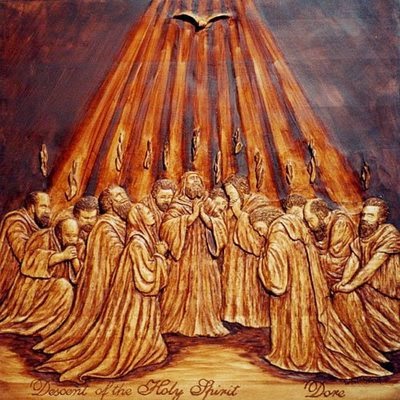 | |
| "Visitation" by Rogier van der Weyden (1399-1464) |
TO CHEW ON: "Blessed is she who believed, for there will be a fulfillment of those things which were told her from the Lord.'" Luke 1:45
(In our church's Wednesday morning women's meeting we've just had a series of lessons on women in the New Testament who interacted with Jesus. The series ended with the story in today's reading.
Gwen, the woman who presented this lesson, is one of our church's beloved matriarchs. For many years she was in charge of our women's ministries and now in her 80s and retired, she still teaches home Bible studies and befriends and mentors women of all ages. She left us with a handout and I credit her and her teaching handout for many of the ideas in today's devo. I have her permission to share.)
We see in this story a beautiful example of an intergenerational relationship. Though the angel never told young Mary to visit elderly Elizabeth, the information he dropped—that Elizabeth was pregnant—was enough, so that after the angel left, Mary hurried to visit her relative.
Her visit was a blessing to both of them. Though the Bible doesn't explicitly state some of these things, we can readily infer them from the what we read and the situation.
Visiting Elizabeth did much for Mary.
- Mary saw for herself that the angel's words were true. Elizabeth was pregnant!
- Mary needed a godly woman to believe her story, believe in her and confirm what God was doing.
- From Elizabeth Mary got godly input, prayer, comfort, encouragement and guidance.
- Together they revisited the scriptures.
- During these three months Mary had time to take in what had happened to her and to prepare for the difficult days ahead.
- Elizabeth modeled focus and faithfulness to her.
But Mary's visit also blessed Elizabeth.
- Humble Elizabeth was amazed that Mary would come to her (Luke 1:43).
- Her welcome was loving and accepting.
- She was sensitive to the Holy Spirit (discerning). On Mary's arrival, Elizabeth gave a word of knowledge (spoke truth) and encouragement to Mary for her faith and obedience (Luke 1:41,42,45).
- Her worshipful and God-centered welcome paved the way for Mary's song of praise (Luke 1:46).
- Mary's visit assured Elizabeth she was part of God's plan and still valuable and useful despite her advanced age.
(I would love to have been a spider in the rafters, watching these two interact during their three-month visit, wouldn't you?)
In the church of today, the story of Mary and Elizabeth illustrate how we as older and younger women can get along and more—can bless each other.
1. We can love each other, and pray together.
2. We can share the Bible, listen, and ask God to reveal truth to us.
3. We can share experiences in openness and honesty.
4. We can affirm each other instead of judging.
5. Of course, we know how to do all this in confidence (don't we?).
PRAYER: Dear Father, help me as part of the older generation to be open to relationships with younger women like Elizabeth was with Mary . Amen.
MORE: The Feast of the Visitation:
Today the church celebrates the Feast of Visitation. The liturgy of the day begins with this collect:
"Father in heaven, by your grace the virgin mother of your incarnate Son was blessed in bearing him, but still more blessed in keeping your word: Grant us who honor the exaltation of her lowliness to follow the example of her devotion to your will; through Jesus Christ our Lord, who lives and reigns with you and the Holy Spirit, one God, for ever and ever. Amen."For an added treat, here is British poet Malcolm Guite's "Hidden Joys: A Sonnet for the Visitation."
*********
Unless otherwise noted all Scripture quotations are taken from the New King James Version®. Copyright © 1982 by Thomas Nelson, Inc. Used by permission. All rights reserved.
















